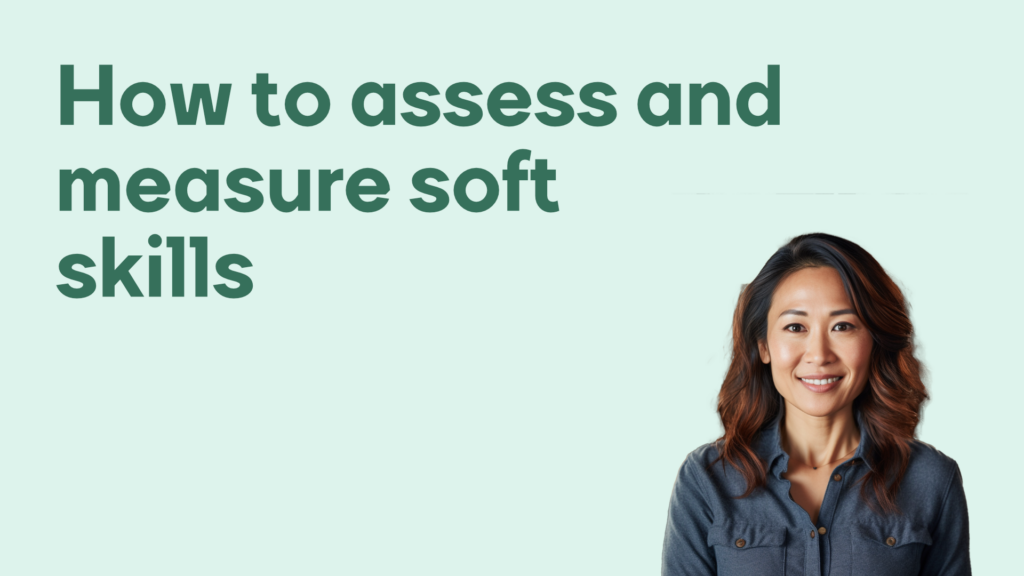Understanding soft skills
Soft skills, defined as the interpersonal and behavioural abilities influencing how individuals engage with others and navigate their environment, play a pivotal role in employee performance. These skills extend beyond specific tasks and are applicable across diverse roles and industries, distinguishing them from hard skills that are more focused on technical knowledge.
Soft skills encompass traits like adaptability, emotional intelligence, creativity, persuasion, and collaboration. Their significance lies in their influence on communication, relationship-building, change management, and conflict resolution in a professional setting.
If you want to know more about soft skills, what they are and why they’re important then check out our ‘What are soft skills?‘ resource page.

The impact of soft skills on hiring
The importance of soft skills in the hiring process cannot be overstated. LinkedIn’s research indicates that a substantial 89% of companies attribute the failure of new hires to a lack of essential soft skills. This finding underscores the limitations of relying solely on prior work experience, as roles with similar titles may involve distinct responsibilities.
Employers recognise the versatility of soft skills, valuing them for determining a candidate’s fit within the company culture, fostering professional growth, building a collaborative workforce, enhancing productivity and innovation, and serving as a critical asset for effective leadership.
Key soft skills employers seek
Drawing insights from a wealth of professional data, LinkedIn identifies five crucial soft skills in demand:
- Adaptability
- Emotional Intelligence
- Creativity
- Persuasion
- Collaboration
Assessing soft skills in the hiring process
Employers employ various methods to assess soft skills during the hiring process. These include:
- Job Application Forms:
Encouraging candidates to provide examples of soft skills in their applications.
Noting extracurricular activities that demonstrate collaboration and social skills.
- Structured Interviews:
Asking open-ended behavioural questions to gauge past actions and soft skills.
Paying attention to non-verbal cues like body language and communication style.
- Psychometric Assessments:
Utilising cognitive ability tests and personality questionnaires to complement interviews.
Assessing skills like communication, reasoning, and attention to detail.
The growing importance of soft skills
Soft skills have become increasingly crucial in the face of technological developments. A study by Deloitte predicts that jobs emphasising soft skills will grow 2.5 times faster than other roles, constituting 63% of all jobs by 2030.
Addressing the ‘skills gap’ dilemma
While job postings emphasise soft skills, a ‘skills gap’ arises as candidates often lack adequate training or support in these areas post-placement. The challenge lies in accurately identifying and cultivating these skills.
The demand for soft skills
Despite the high demand for soft skills, a gap exists between business needs and the available workforce possessing these skills. LinkedIn’s survey highlights that 92% of talent professionals consider soft skills as important or more important than hard skills in recruitment.
Why soft skills matter
Soft skills, encompassing traits like creativity, empathy, critical thinking, and interpersonal skills, are vital for success in diverse roles. Their increasing importance stems from their versatility and applicability to various situations in an evolving digital society.
How to assess and measure soft skills effectively
To measure soft skills accurately, organisations can employ formalised, psychometrically valid methods. We at Clevry, for instance, combine data, technology, and psychology to assess candidates across a range of key skills:
- Personality:
Determines how individuals approach their work and interact with others.
- Mental Firepower:
High general ability, or ‘common sense,’ influences decision-making in job-related tasks.
- Emotional Intelligence:
Measures the ability to understand and manage one’s emotions and those of others.
- Values & Motivations:
Aligning personal values and motivations with job demands enhances performance and job satisfaction.
In today’s dynamic world of work, the significance of soft skills cannot be overstated. They are the linchpin of effective communication, collaboration, and overall employee performance. As businesses increasingly recognise the key role that soft skills play, the challenge lies in effectively identifying, cultivating, and assessing these crucial attributes.
That’s where Clevry’s online assessment platform comes in – specifically built to measure and assess candidates across a spectrum of soft skills and personality traits. By leveraging data, technology, and psychological insights, our platform offers a robust framework to enhance your hiring processes. This empowers organisations to make better hiring decisions, ensuring that they not only bridge the soft skills gap but also usher in a new era of more efficient and effective recruitment.
By understanding and measuring soft skills effectively, organisations can not only better predict job performance but also develop an organisational culture where employees thrive, innovate, and drive success.
Sources:
https://www.linkedin.com/pulse/linkedin-2019-talent-trends-soft-skills-transparency-trust-bersin/
